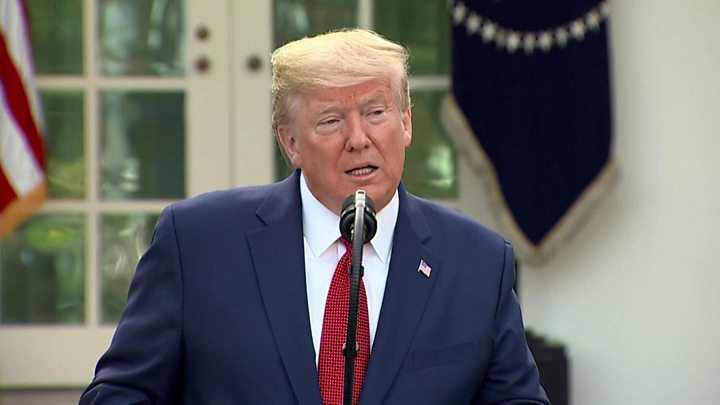
President Donald Trump has said federal coronavirus guidelines such as social distancing will be extended across the US until at least 30 April.
He had previously suggested that they could be relaxed as early as Easter, which falls in mid-April.
"The highest point of the death rate is likely to hit in two weeks," Mr Trump said.
He appeared to be referring to peak infection rates that it is feared could overwhelm hospitals.
White House medical adviser Dr Anthony Fauci had earlier warned that the virus could kill up to 200,000 Americans.
Dr Fauci said that it was "entirely conceivable" that millions of Americans could eventually be infected.
- Live: Our rolling coronavirus coverage
- Trump backs away from New York 'quarantine'
- What this crisis reveals about the US
The US now has more than 140,000 confirmed cases.
As of Sunday evening, 2,493 deaths had been recorded in the country in relation to Covid-19, according to figures collated by Johns Hopkins University.
The United States overtook both China and Italy last week in the number of reported cases.
- A SIMPLE GUIDE: What are the symptoms?
- AVOIDING CONTACT: Should I self-isolate?
- STRESS: How to protect your mental health
- MAPS AND CHARTS: Visual guide to the outbreak
What did Trump say?
Speaking during the latest Coronavirus Task Force press briefing at the White House on Sunday, the president said that measures such as social distancing were "the way you win", adding that the US "will be well on our way to recovery" by June.
Suggesting that the "peak" of death rates in the US was likely to hit in two weeks, Mr Trump said that "nothing would be worse than declaring victory before victory is won - that would be the greatest loss of all".
Analysts suggest that when Mr Trump referred to a peak in the "death rate", he probably meant the total number of recorded infections.
He said the decision to extend social distancing was made after he heard that "2.2 million people could have died if we didn't go through with all of this", adding that if the death toll could be restricted to less than 100,000 "we all together have done a very good job".
The 2.2 million figure he was referring to appeared in a coronavirus impact report published by Imperial College London on 16 March.
Mr Trump had previously said that Easter - 10-13 April - would be a "beautiful time" to be able to open at least some sections of the country. On Sunday he said that lifting restrictions at Easter was "just an aspiration".
"I wish we could have our old life back... but we're working very hard, that's all I know. I see things, I see numbers, they don't matter to me. What matters to me is that we have a victory over this thing as soon as possible," he said.
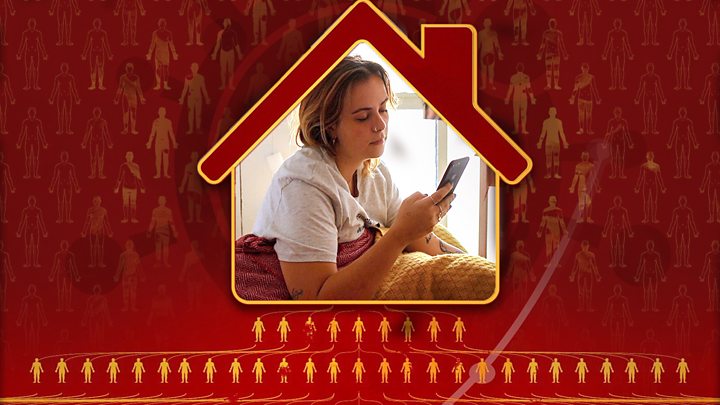
The president also talked on Sunday about the medical response. He said that "rapid testing" had been approved to get Covid-19 results within five minutes, and that doctors, nurses and other healthcare workers would be tested.
Meanwhile, an anti-viral drug - hydroxychloroquine - was being administered to 1,100 patients in New York.
"Let's see how it works, we may have some incredible results," he said.
Mr Trump said that experts were also looking at blood transfusions to treat the sick, using the blood taken from people who had recovered.
What about the shortage of equipment?
Earlier on Sunday, Mr Trump accused hospitals in some states of "hoarding" ventilators, face masks and other critical medical supplies.
"We do have a problem with hoarding... including ventilators. Hospitals need to release them - in some cases they have too many, they have to release medical supplies and equipment," he said.
Hospitals "can't hold [ventilators] if they think there might be a problem weeks down the road", he said, alleging that some were "stocked up".
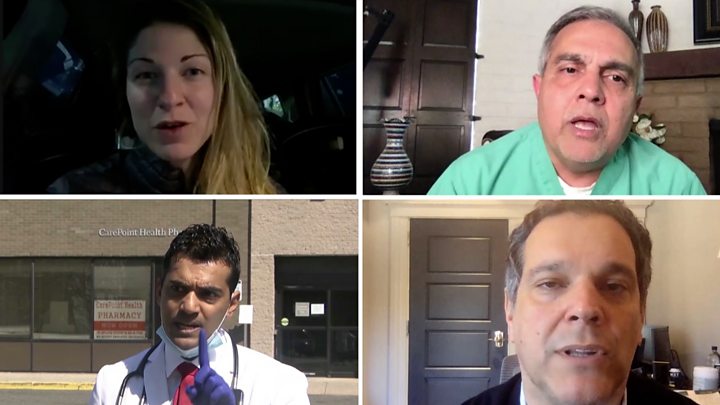
The availability of ventilators is a major concern among health professionals as demand has surged with the spread of the virus. A number of states have warned that they will soon not have enough to treat patients suffering from Covid-19.
The new coronavirus can cause severe respiratory issues as it attacks the lungs, and ventilators help to keep patients breathing.
President Trump has ordered General Motors in Detroit to produce more of the medical machines to satisfy demand.
In a separate development, a new breathing aid has been created that can help keep coronavirus patients out of intensive care. The device was built by the Mercedes Formula One racing team, working in collaboration with engineers from University College London.
What is the latest from elsewhere?
More than 30,000 people are now confirmed to have died worldwide after being infected with the new coronavirus.
Some of the latest major global developments include:
- Australia tightened its restrictions on movement. Public gatherings are now limited to just two people. Playgrounds, outdoor gyms and parks are closed from Monday.
- South Korea's President Moon Jae-in said emergency cash payments would be made to all households except the top 30% by income.
- In the UK, a further 209 people were confirmed to have died over 24 hours, raising the death toll to 1,228. Prime Minister Boris Johnson warned that things would get worse before they got better.
- Spain recorded a new daily record of deaths, reporting 838 victims on Sunday. New restrictions also came into force in the country, meaning that all non-essential workers should stay at home for the next 11 days.
- Italy recorded 756 new deaths in the past 24 hours, bringing the total to 10,779. This is a slight drop in the daily number of people dying.
- France reported 292 new deaths, bringing its total to 2,606. Specially modified trains have begun transporting patients from the worst-hit areas in the east of the country to hospitals in the south.
- Coronavirus: 'Millions' of Americans could be infected, expert warns
- Coronavirus: Trump backs away from New York quarantine
- Coronavirus: Reopening the US by Easter 'a beautiful timeline'
- Coronavirus: Trump orders 'time-wasting' General Motors to make ventilators
- Economic meltdown brings political pain

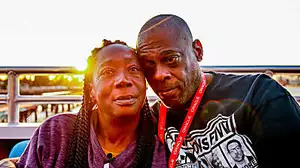


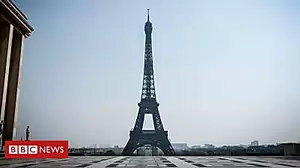
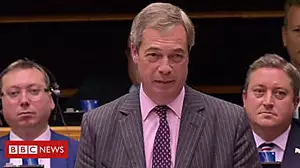
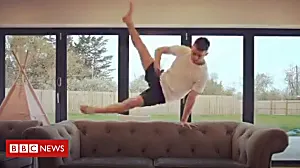

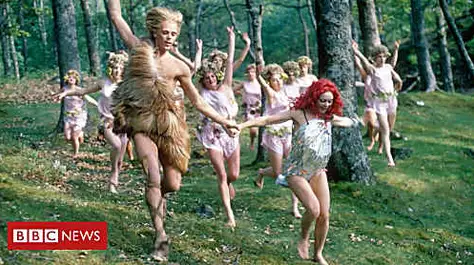
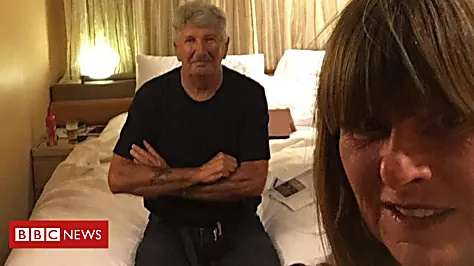
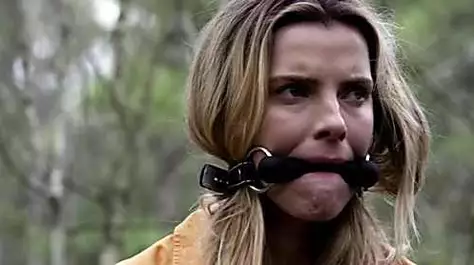
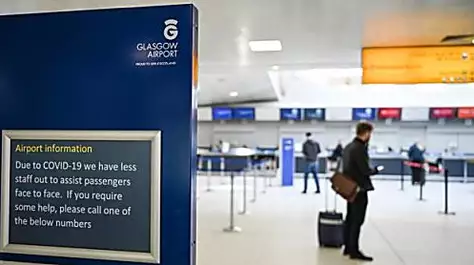



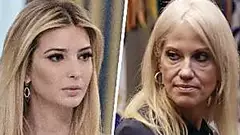
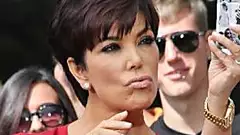
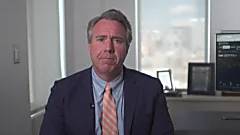
![[Gallery] Meet The Animal That Lives For 11,000 Years [Gallery] Meet The Animal That Lives For 11,000 Years](https://images.outbrainimg.com/transform/v3/eyJpdSI6Ijg4Mzk3NzBmNGE5MzhmODI4NTQ3OWEzMWZlZTczZDcxNjEwMmFkYjc0NjcyNjEyOGZlMDMyYTI3MmMzOWQ2ZTAiLCJ3IjoxNjAsImgiOjkwLCJkIjoxLjUsImNzIjowLCJmIjo0fQ.webp)
No comments:
Post a Comment